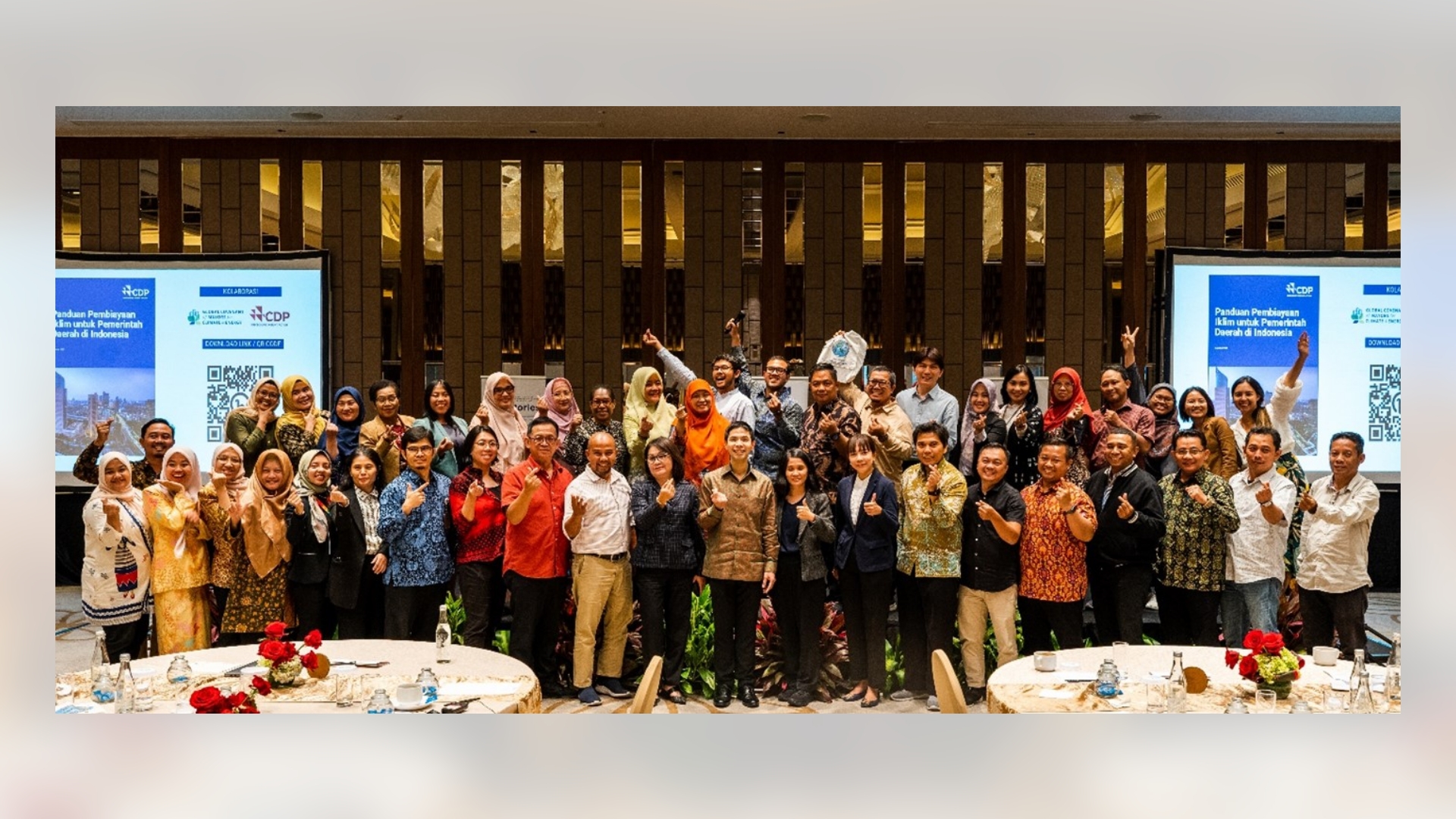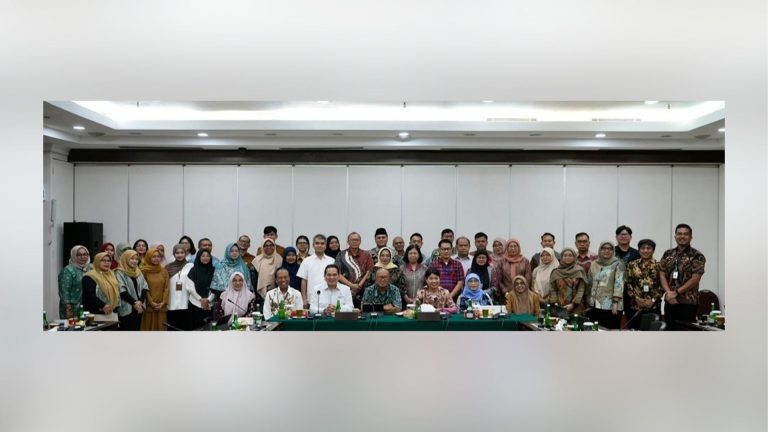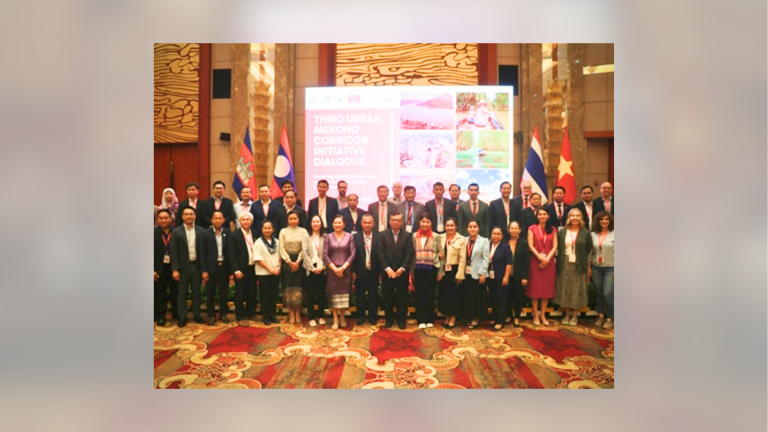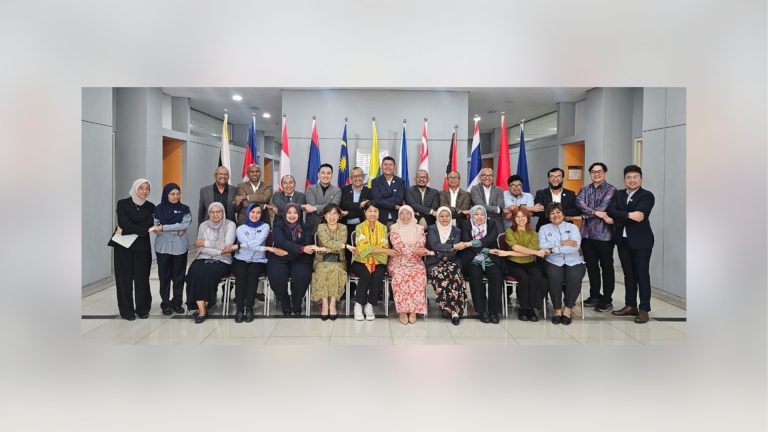August 30-31, 2023 | Jakarta – UCLG ASPAC, the host of the Global Covenant of Mayors for Climate and Energy (GCoM) Southeast Asia Secretariat, organised a two-day National Workshop taking the theme “Moving Towards Implementation: Alternative Opportunities for City Level-Climate Action.” The workshop prepared local governments for their steps towards the implementation of the city’s climate plan. Approximately 117 participants, from 22 cities and regencies across Indonesia as well as guests from various local and international partners, benefited from this event, which also integrated activities and case studies from cities to enhance the learning and experience. This event also saw the launch of Climate Action Plans of Medan, North Minahasa, Pontianak, and Tangerang, as well as the awarding of GCoM Badge to nine GCoM cities, including Banda Aceh, Bontang, Jakarta, and Tanjung Pinang for their outstanding climate plans. This workshop was graced by Ms. Henriette Faergemann, the First Counsellor of Environment, Climate Action, ICT, European Union (EU) Delegation to Indonesia; Dr. Bernadia Irawati Tjandradewi, Secretary-General of UCLG ASPAC; and Ms. Marulina Dewi Mutiara, Head of the Regional Bureau of DKI Jakarta Province.
Session 1 – Thematic Session on Urban Mobility, Urban Drainage System, and “Smart City”
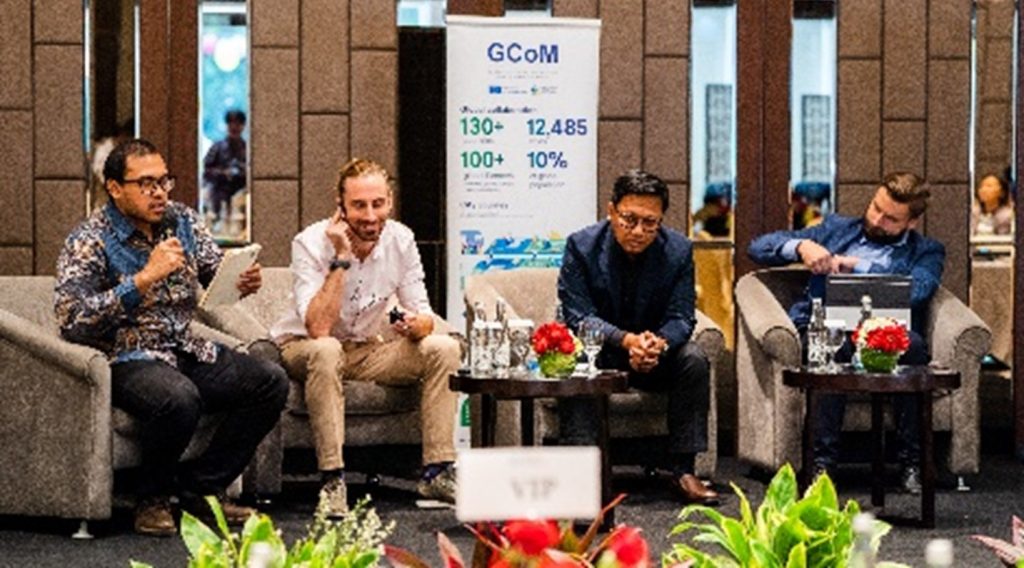
Three speakers presented their innovation-based efforts in handling climate change for cities and local governments. Mr. Conrad Richardson of Sustainable Mobility in Metropolitan Regions (SMMR), shared the public transport modelling schemes for ASEAN nations, integrated city mobility concepts for every ASEAN nation, its various approaches such as policy review with ASEAN nations, capacity development and coaching, as well as pro-active methods in transport modelling. Mr. Adriadi Dimastanto of the Indonesian Association of Urban and Regional Planners (IAP) presented urban water management planning, the concept of Water Sensitive Urban Design (WSUD), an integrated city to water sources planning concept. Dr. Haris Piplas of Drees & Sommer Switzerland, shared smart city modelling that utilises human resources more than technology, highlighted partnerships, and presented comparisons with European Cities implementing Smart City: including Zürich (Switzerland), Ingolstadt (Germany), Berlin (Germany), and Vienna (Austria).
Session 2 – Experience Sharing with Cities & Working Group Session: Financing Climate Technology and Innovations at a Local Level
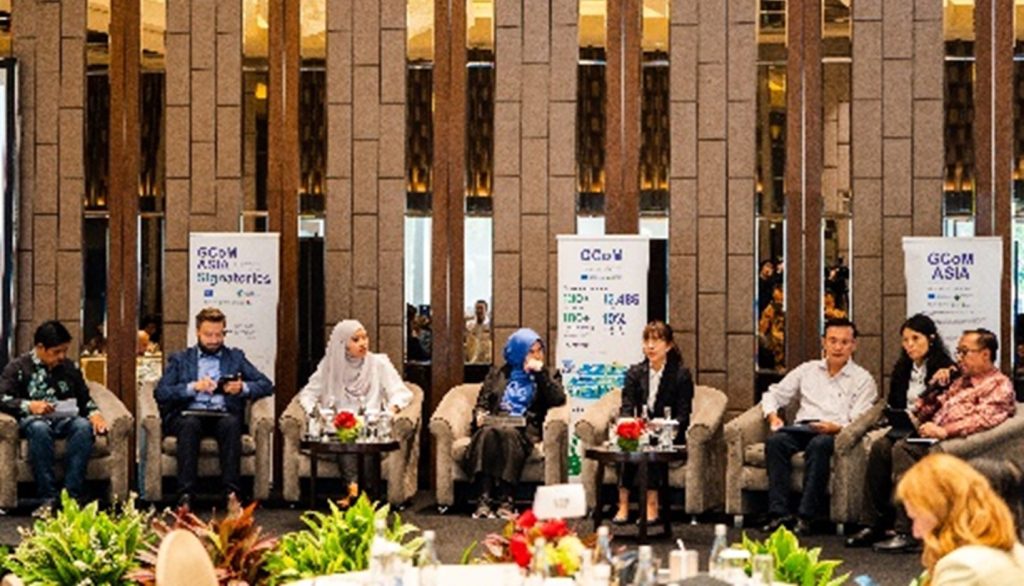
In this session, GCoM cities representatives shared their experiences on how to implement climate mitigation and climate adaptation plans to their cities in working group. From the “Climate Mitigation” section, Jakarta (Indonesia) described its mitigation plans on GHG emission reduction and climate adaptation, mainly through waste management plans such as establishment of Refuse Derived Fuel plants, waste management sites, and other waste-related infrastructures; Cao Lanh shared the city’s eco-friendly improvement on public lighting by using LED lights and electricity-efficient lights; Bangkok Metropolitan Administration showcased Bangkok’s climate action plans known as “Bangkok’s Masterplan on Climate Change.”
For the “Climate Adaptation” section, Dr. Haris Piplas of Drees & Sommer shared how European Cities adapted to climate change; Pontianak City presented the city’s riverfront revitalisation around Kapuas River (Indonesia’s longest river); and Segamat highlighted the importance of open green spaces.
Session 3 – Dialogue with National-Level Ministries: Financing Needs for Cities
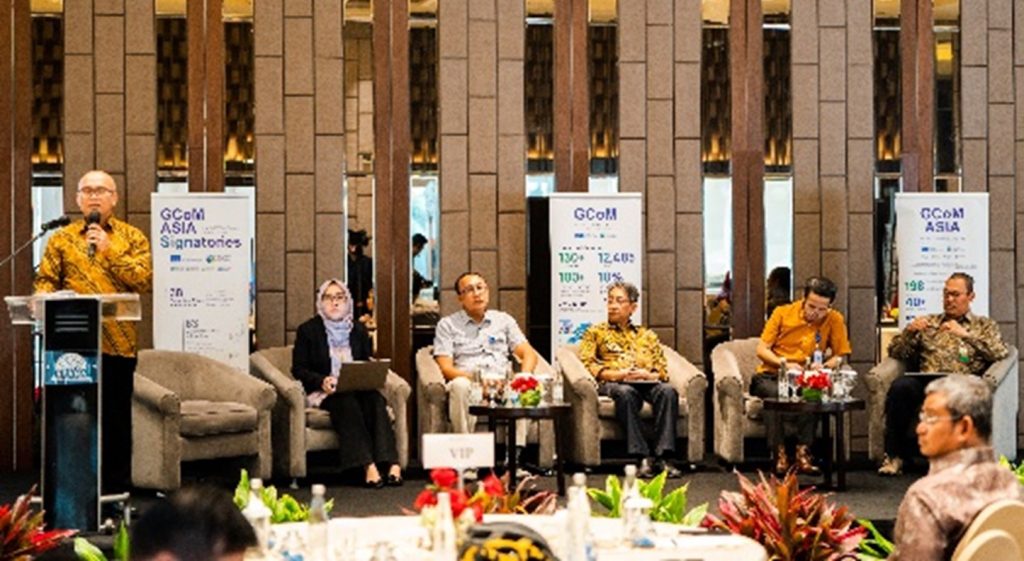
Indonesian National-Level Ministries and Institutions engaged with participants on discussion of financing needs. Mr. Agus Rusly of Indonesian Ministry of Environment and Forestry (KLHK) discussed the national context of funding needs for climate mitigation and adaptation in Indonesia, as well as insights regarding Indonesia’s funding commitment on Paris Agreement, NDC targets, and other climate-related actions were shared for participants to reflect and implement on their plans. Dr. Joko Tri Haryanto, Executive Director of Indonesian Environment Fund (IEF) presented ideal funding mechanisms for local governments to actualise their climate plans: public finance, private finance, and blended finance. Dr. Antonius Hari of Financial Services Authority (OJK) emphasised on how climate finance is also beneficial in the capital market and the crucial role of national financial sector in climate change adaptation. Mr. Eko Nur Prihandoko of Fiscal Policy Agency (BKF), presented the implementation of Green Climate Fund (GCF) in Indonesia. Ms. Anna Amalia of Bappenas presented the concepts of “Blue Book” and “Green Book,” guidance for an eco-friendly economy transition. The dialogue then continued by CAPs pitching of five GCoM cities.
Session 4 – Tools and Platforms for Facilitating Climate Finance at the City Level
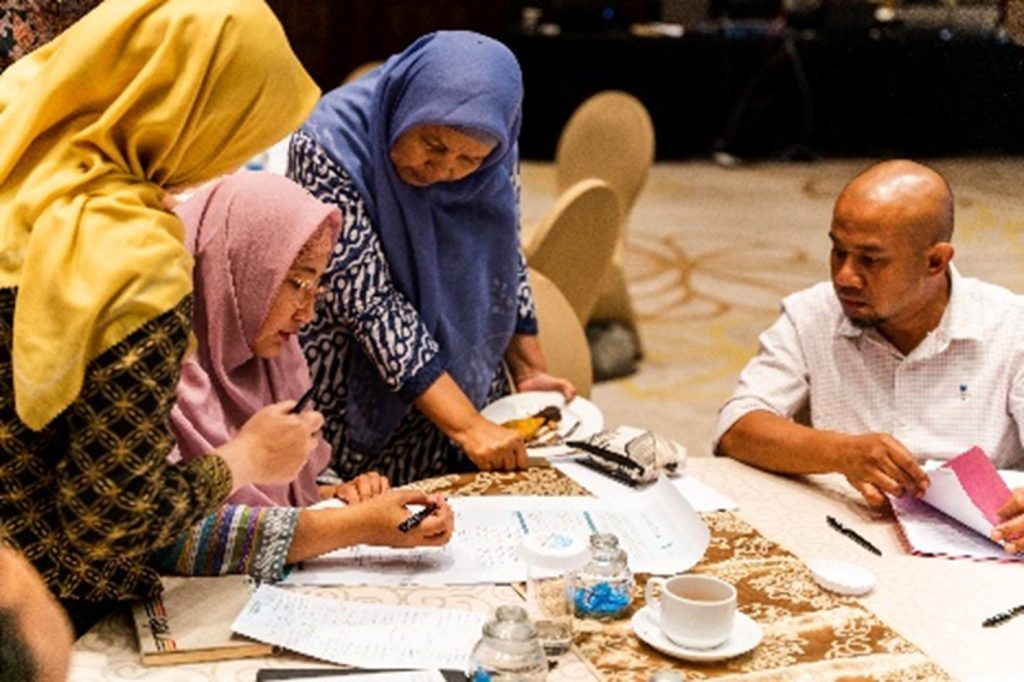
This session engaged participants through interactive discussion and provided details regarding facilities, utilities, or tools to assist climate finance needs for various cities. PT. Sarana Multi Infrastruktur (SMI), CDP Asia-Pacific and United Nations Capital Development Fund (UNCDF) presented their beneficial tools for climate funding: from utilisation of loans (PT. SMI), carbon reporting medium for local governments (CDP), sustainable financing for urban development (UNCDF). There was also group presentation regarding bankable project proposal through the Expression of Interest (EoI) to discuss the climate funding facilities further. The activity helped improving connections between participants from various institutions and stakeholders and showcased various platforms for climate fundings.
This national workshop finalised the GCoM SEA programme for cities in Indonesia. UCLG ASPAC, as the Secretariat of GCoM SEA, thanks all city mayors, partners, and relevant stakeholders committing to support cities in realising their climate ambition.
*****








